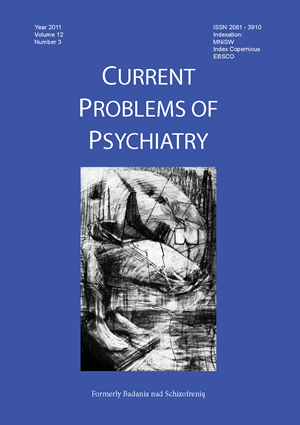Lesch Alcoholism typology – clinical picture
Keywords:
Lesch typology, alcohol addiction, withdrawal symptomsAbstract
The article presents alcoholism typology created by Otto Lesch. The discussed typology was based on longitudinal studies among patients. The analyzed data concerned different reasons for consuming alcohol, patients’ personality structure, as well as neuro-physiological parameters of their functioning. The first type, called “the allergy model”, is connected with severe withdrawal symptoms, such as tremor, tachycardia or anxiety. In this case, alcohol is used to cope with withdrawal symptoms. Type II, named “the fear model”, regards patients with primal anxiety and mood disorder. In this type alcohol is consumed in order to alleviate tension and anxiety. Patients included in the type III, use alcohol as antidepressant that enhances mood and reduces associated symptoms of psychiatric disorders. The last one, type IV, called “the conditioning model”, refers to patients, who underwent a central nervous system trauma in the early childhood. Moreover, these patients experience impaired cognitive functioning and present less criticism towards effects of overusing alcohol.
References
1. Lesch O., Dietzel M., Musalek M., Walter H., Zeiler K. The course of alcoholism. Long-term prognosis in different types. Forensic Science International, 1988; 36(1-2): 121-138.
2. Kogoj D, Lesch O, Walter H, et al. Lesch Alcoholism Typology Medical Treatment and Research. Arch. Psychiatr. Psychother., 2010; 12(4): 37-48.
3. Woronowicz B.T. Uzależnienia. Geneza, terapia, powrót do zdrowia. Warszawa; Wydawnictwo Edukacyjne PARPAMEDIA: 2009.
4. Lesch O., Walter H. Subtypes of alcoholism and their role in therapy. Alcohol Alcohol., 1996; 31(1): 63-67.
5. Wojnar M., Ślusarska A., Klimkiewicz A. Nawroty w uzależnieniu od alkoholu Część 3: Społeczno-demograficzne i psychologiczne czynniki ryzyka. Alkoholizm i Narkomania, 2007; 20(1): 81-102.
6. Samochowiec A. The influence of parents personality measured by temperamental and character inventory (TCI) on course of alcoholism characterized by Cloninger’s and Lesch’s typologies. Roczniki Pomoirskiej Akademii w Szczecinie, 2010; 56 (2): 33-29.
7. Jakubczyk A., Wojnar J., Wojnar M., Klimkiewicz A., Brower K. Zaburzenia snu u osób uzależnionych od alkoholu. Alkoholizm i Narkomania, 2009: 22(2): 143-159.
8. Kiefer F., Barocka A. Secondary depresion in weaned alcoholics: Implications of Lesch’s typology of chronic alcoholism. Alcohol Alcohol., 1999; 34(6): 916-919.
9. Walter H, Gutierrez K, Ramskogler K, Hertling I, Dvorak A, Lesch O. Gender-specific differences in alcoholism: Implications for treatment. Arch. Womens Ment. Health, 2003; 6(4): 253-258.
Downloads
Published
Issue
Section
License
Copyright (c) 2011 Authors

This work is licensed under a Creative Commons Attribution-NonCommercial-NoDerivatives 3.0 Unported License.


